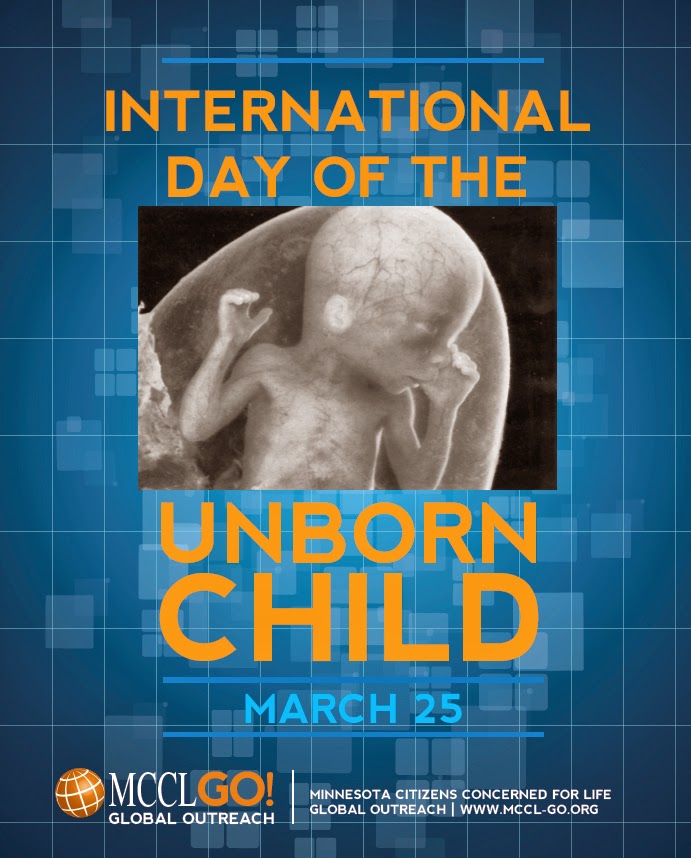Today, pro-life communities and communities of faith around the world are observing the International Day of the Unborn Child.
The observance is to recognize the need to protect and care for expectant mothers and their unborn children.
 The first official declaration recognizing a “Day of the Right to Be Born” came in El Salvador in 1993. The first “Day of the Unborn” was officially recognized in Argentina. Then-president of Argentina, Carlos Menem, established it in an effort to fulfill a promise that he had made to Pope John Paul II.
The first official declaration recognizing a “Day of the Right to Be Born” came in El Salvador in 1993. The first “Day of the Unborn” was officially recognized in Argentina. Then-president of Argentina, Carlos Menem, established it in an effort to fulfill a promise that he had made to Pope John Paul II.
This celebration of life had its earliest beginnings in individual faith communities. Many priests and parishes saw the natural relationship between March 25th and the unborn child. The Feast of the Annunciation, on March 25th, celebrates the moment when the angel Gabriel announced to the Virgin Mary that she would be the mother of Jesus Christ. This was seen as a day to draw attention to life in the womb.
Today marks the first time the nation of Chile is officially celebrating March 25 as the Day of the Unborn Child.
Over the years, the international pro-life community in various countries has embraced the day as a time to recognize not only the humanity of the unborn child but also the inherent dignity of all human life.
In some countries, the day is designated by the Catholic Church and, in others, it is officially acknowledged by the government.
Countries all across the globe participate. In 2002, Peru’s Congress designated March 25th as the “Day of the Unborn” and Ecuador proclaimed March 25th as the “Day of the Unborn” in 2006.
On the other side of the world, the Philippines designated it as a day to remember the unborn through a presidential proclamation in 2004. Spain recognizes it as the “International Day of the Unborn.”
Organizations and groups such as the Knights of Columbus and Priests for Life also recognize the day in an official capacity. The Knights of Columbus passed a resolution in 2002 proclaiming the day as the Day of the Unborn Child.
In a written statement, Carl Anderson, the Supreme Knight ,said, “May this day be the occasion for all of us to witness to the sanctity of God’s great gift of life and to further resolve to protect and defend it.”
But why should it be necessary to recognize a day to celebrate the life of the unborn child?
Tragically, there are still too many abortions here in the United States and around the world. The Obama administration has pushed an agenda that promotes abortion in broad and sweeping actions. While the number of abortions in the U.S. in recent years has decreased, there are still over a million lives lost each year! Since the 1973 decision by the U.S. Supreme Court legalizing abortion on demand, there have been over 56 million abortions performed in the United States.
Proclaiming an International Day of the Unborn Child gives the pro-life community around the world an opportunity to promote a Culture of Life and educate fellow citizens about the beauty and dignity of the unborn child.
In some communities, pro-life groups hold prayer services or vigils; some people may attend a special Mass or Rosary service. Others may participate in fundraising for local crisis pregnancy centers.
In recognition of Argentina’s declaration in 1999, Pope John Paul II sent a statement to Argentinian President Menem that included the following:
“The Catholic Church sees in the attacks against human life a grave offense against the Creator (cf. Gaudium et Spes). In this sense, I have not spared any efforts in proclaiming the value and inviolable character of life…I express my best wishes that the celebration of ‘The Day of the Unborn Child’ will favor a positive choice in favor of life and the development of a culture in this direction which will assure the promotion of human dignity in every situation.”
Technology has given us the ability to see into the womb, science tells us the unborn child can feel pain, and medicine treats the unborn child as a separate patient. As the pro-life movement promotes the International Day of the Unborn Child, the reality of life in the womb is being fostered in our communities.
Through this, the work to create a culture that embraces the humanity of the unborn child and the value of human life is being carried out all over the globe.







